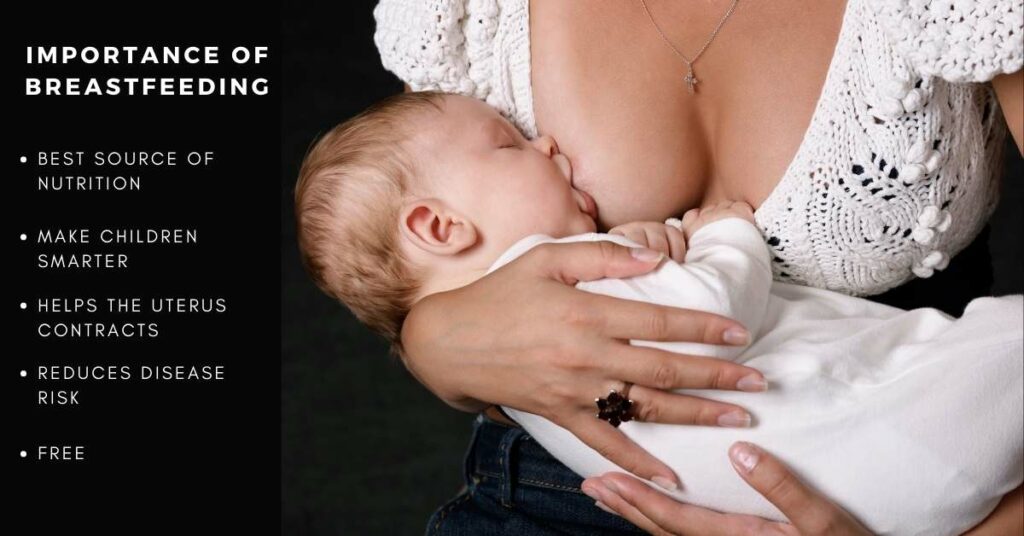Why Is Breastfeeding Important For Mother And Baby
Why is breastfeeding important for mother and baby? Simple yet meaningful question. The importance of breastfeeding is so numerous that most health agencies and professionals recommend it for every mother in the world for as long as possible.
Breastfeeding has health benefits for both a baby and the mother. Breast milk provides the baby with ideal nutrition and supports growth and development. While for the mothers, it provides physical and mental health benefits. The baby and the mom protect them from certain illnesses and diseases.
Before you decide not to breastfeed your baby, know first the importance of breastfeeding, which is listed below.
Breastfeeding is an investment in health, not just a lifestyle decision.
Table of Contents
Why is breastfeeding important for mother and baby?
For the baby:
Breastfed babies have a reduced risk of:
- Asthma
- Breastfeeding reduces the risk of asthma, atopic dermatitis, and eczema.
- Obesity
- Breastfeeding promotes healthy weight gain and helps prevent childhood obesity.
A study showed that breastfeeding for longer than four months significantly reduced the chances of a baby developing overweight and obesity. This may be due to the development of different gut bacteria. Breastfed babies have higher amounts of beneficial gut bacteria, which may affect fat storage.
Babies fed breast milk also have more leptin than formula-fed babies. Leptin is a crucial hormone for regulating appetite and fat storage.
Breastfed babies also self-regulate their milk intake. They’re better at eating until they have satisfied their hunger, which helps them develop healthy eating patterns.
- Type 1 diabetes
- Breastfeeding reduces the risk of developing Type 1 diabetes and non-insulin-dependent (Type 2) diabetes.
- Severe lower respiratory disease
- Breastfeeding can protect against multiple respiratory and gastrointestinal acute illnesses.
- Acute otitis media (ear infection)
- Breastfeeding, particularly exclusively and as long as possible, may protect against the middle ear, throat, and sinus infections well beyond infancy.
- Sudden infant death syndrome (SIDS)
- Breastfeeding is linked to a reduction of SIDS, especially when feeding exclusively.
- Gastrointestinal infections (diarrhea/vomiting)
- Breastfeeding reduces gut infections.
- Necrotizing enterocolitis (NEC) for preterm infants
- Feeding preterm babies breast milk is linked with a reduction of this incident or with intestinal tissue damage.
- Childhood leukemia
- Breastfeeding reduces the risk of childhood leukemia.
- Bowel diseases
- Breastfed babies may be less likely to develop Crohn’s disease and ulcerative colitis.
For the mother:
Breastfeeding can help lower a mother’s risk of:
- High Blood Pressure
- Type 2 diabetes
- Ovarian Cancer
- Depression
- Postpartum depression (PPD) is a type of depression that can develop shortly after childbirth.
Women who breastfeed seem less likely to develop postpartum depression than mothers who wean early or do not breastfeed.
- Breast Cancer
- Obesity
- Some women seem to gain weight after giving birth, and others seem to lose weight effortlessly.
Breastfeeding does burn more calories, and after three months of lactation, a mother likely experiences an increase in fat burning compared to non-lactating mothers.
6 reasons why breastfeeding is important for mother and baby!

Breast milk is the best source of nutrition for most babies.
As the baby grows, the mother’s breast milk will change to meet her baby’s nutritional needs.
Breast milk contains everything a baby needs for the first six months of life, in all the right proportions. Its composition even changes according to the baby’s changing needs, especially during the first month of life.
The breasts produce a thick and yellowish fluid called colostrum during the first days after birth. It’s high in protein, low in sugar, and loaded with beneficial compounds. It’s truly a wonder food and not replaceable with formula.
Colostrum is the ideal first milk and helps the newborn’s immature digestive tract develop. After the first few days, the breast starts producing enormous milk as the baby’s stomach grows.
Breast milk shares antibodies from the mother with her baby.
These antibodies help babies develop strong immune systems and protect them from illnesses.
Breast milk is loaded with antibodies that help your baby fight off viruses and bacteria, which is critical in those tender, early months.
Colostrum, the first milk, provides high amounts of immunoglobulin A (IgA) and several other antibodies.
IgA protects the baby from getting sick by forming a protective layer in the baby’s nose, throat, and digestive system.
The formula doesn’t provide antibody protection for babies. Studies claim formula-fed babies are more vulnerable to health issues like pneumonia, diarrhea, and infection.
Breastfeeding may make children smarter.
Studies suggest differences in brain development between breastfed and formula-fed babies.
This difference may be due to the physical intimacy, touch, and eye contact associated with breastfeeding and nutrient content.
Studies indicate that breastfed babies have higher intelligence scores, are less likely to develop behavioral problems, and have learning difficulties as they grow older.
However, preterm babies with a higher risk for developmental issues have the most pronounced effects.
The research clearly shows that breastfeeding has significant positive effects on babies’ long-term brain development.
Breastfeeding helps the uterus contract.
During pregnancy, the uterus grows immensely, expanding from the size of a pear to filling almost the entire space of your abdomen.
After delivery, the uterus goes through an involution process, which helps it return to its previous size. Oxytocin, a hormone that increases throughout pregnancy, helps drive this process.
The body secretes high amounts of oxytocin during labor to help deliver the baby and reduce bleeding. It can also help you bond with your new little one.
Oxytocin also increases during breastfeeding. It encourages uterine contractions and reduces bleeding, helping the uterus return to its previous size.
Studies have also shown that mothers who breastfeed generally have less blood loss after delivery and faster involution of the uterus
Breastfeeding reduces your disease risk
Continued breastfeeding also pauses ovulation and menstruation. The suspension of menstrual cycles may be nature’s way of ensuring there’s some time between pregnancies.
Breastfeeding saves money and time.
Breastfeeding is primarily free, barring expenses for lactation consulting and breast pumps. By choosing to breastfeed, you won’t have to:
- Spend money on formula
- Calculate how much your baby needs to drink daily
- Spend time cleaning and sterilizing bottles
- Mix and warm up bottles in the middle of the night (or day)
- Figure out ways to warm up bottle while on the go
Breast milk provides optimal nutrition for babies. It has the right amount of nutrients, is easily digested, and is readily available.
Breast milk contains antibodies and other elements that protect you and your baby from illness and chronic disease.
Breastfeeding is the best start you can give if you are able.





